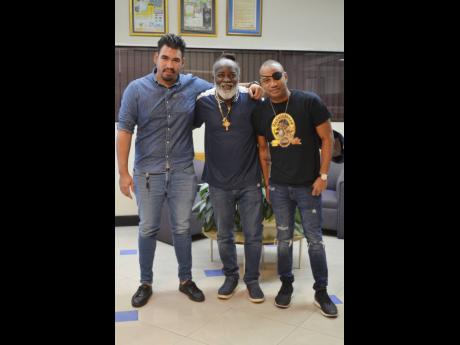Siri, can you play a dubplate? - Sound system experts say ‘specials’ still integral even as technology makes its stamp
Dubplates and specials are integral to the sound system culture, and in a space where there is an overwhelming number of sounds, specials are used to distinguish the various players in the business. David Harper of Killamanjaro stated at a recent Gleaner Entertainment Forum that dubplates found fame in the energetic clash arena.
“They were more important in the combative arena, but later on, they were used to differentiate yourself from other sounds and show off different styles. A dub in particular that we used a few years ago to kill Black Cat (sound system) was a song actually by Freddie McGregor. It was customised just for [use against] Black Cat in a clash in Canada. He wrote over the Big Ship song specifically for that event, and because it is customised, you going to get a bigger effect, a bigger forward.”
The experts at the forum pointed out that specials show creativity and that the staging of any big sound clash heightens the demand for “extra special specials”, as sounds jostle to show their supremacy. One such example is the clash aboard the hugely popular Jamrock Cruise.
“I customise Big Ship one time and Mighty Crown used it and kill Matterhorn on the Jamrock Cruise. I changed the chorus and say: ‘Dem ketch Matterhorn a dutty whine inna di ocean …’, little things like that, and the crowd love it,” McGregor said.
The advent of technology has also had its impact on the dynamics of the dubplate culture.
‘Easy as a download’
“Basically, now, you can just download a song and play it, but before, you couldn’t. If that sound play a song on a dubplate or special or acetate, or whatever, you coulda say, ‘if you play da song yah now, mi pack up and leave’.
Nobody can’t say that again. I can download it right away and I can remix something at that same clash and play it same time,” Delano Thomas of Renaissance Disco said.
He related the story of a guy in Germany at a recent sound clash who programmed Siri to sound like the captain of the ship and “mash up the dance”. Siri won the clash.
Harper noted that loyalty is key to the success of any special, because if a sound paid an artiste to do a special for a particular clash, it is an unwritten agreement that the artiste shouldn’t go back and counteract himself by going to the competing sound and voicing a special to kill his own special. But, this is the dancehall, and the forum acknowledged that this has been done.
Harper recalled that some years ago, an artiste called him to say that he had just voiced a special for a sound ‘Jaro was going up against and asked if he wanted the counteraction.
Well, as they say, all’s fair in love and war, and there is no field more combative than a sound clash.
Dubplates vs specials
These days, the terms are used interchangeably, but as the experts in The Gleaner’s Entertainment Forum pointed out, there actually is a difference between a dubplate and a special.
Delano pointed out that a dubplate is a physical disc, usually 10 inches in diameter. “The real thing about a dubplate that a lot of people don’t know, is that it actually is an acetate that the producers used to test the master before they pressed the real record.”
If, after testing, it was deemed that the song was good enough, then it was mastered for the subsequent pressing of a vinyl record for release. The first use of dubplates is commonly attributed to sound engineer King Tubby and sound systems such as Sir Coxsone and Killamanjaro. While Noel ‘Papa Jaro’ Harper of the legendary sound system was not present at the forum, his son and heir David, was, and could speak knowledgeably of the business. He agreed that what is referred to as a dubplate is a customised version of an actual song.
Big Ship Captain, Freddie McGregor, showed his firsthand knowledge of the process from the cutting of the dub to the making of the song. “As soon as Mr Dodd find a song and him love it and him want know if this going to run way, him find a acetate – dem come in a box and have a hole in the middle – and him take out one. Mr Dodd get the song run off on the acetate and put it in him bag and carry it to the dance. Him test it over that sound deh and it mash up the place and then him take it back and go play it couple more time. Based on the response, him might say it want little more mid, or it want little more bass before him run it off on vinyl,” McGregor explained.
With the increasing dominance of the sound clash culture, specials and one-off versions of a song would be cut to acetate for competing in a clash, and as the members of the forum agreed, these would become known as “dubplate specials”. The litmus test of any sound remains the calibre of specials in its arsenal.

